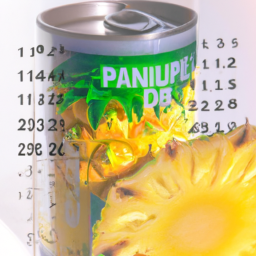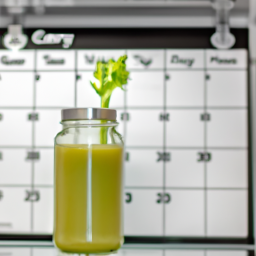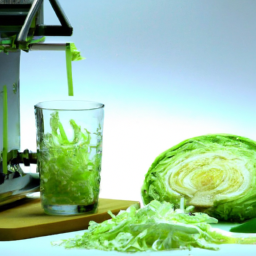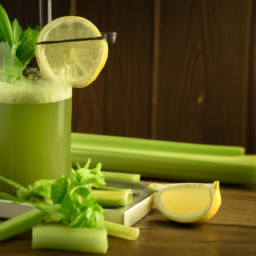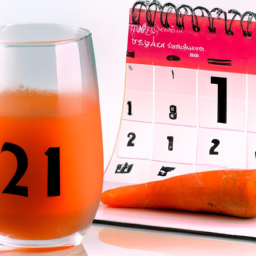I love canned pineapple juice and always make sure to stock up on several cans whenever I go grocery shopping. But have you ever thought about how long canned pineapple juice lasts? Knowing the expiration date of canned pineapple juice is important to make sure you’re enjoying it while it’s still fresh and safe to drink.
In this article, I will discuss the factors that affect the shelf life of canned pineapple juice, how to properly store it, and how to tell if it’s gone bad. Canned pineapple juice has a longer shelf life compared to its fresh counterpart, but it doesn’t last forever.
Factors that affect the shelf life of canned pineapple juice include its processing method, the type of can it is stored in, and the storage conditions. In general, canned pineapple juice can last up to two years past its expiration date, but it’s important to check the label for the exact expiration date.
It’s also important to inspect the can for any damage or bulging, as this could indicate that the juice has gone bad. In the next sections, I will discuss the signs of spoilage and proper storage techniques to ensure that you are consuming fresh and safe canned pineapple juice.
Key Takeaways
- Canned pineapple juice can last up to 2 years past expiration date if stored properly in a cool, dry place away from sunlight and heat sources.
- Signs of spoilage include sour/rancid smell, dull/discolored appearance, and off-taste. Expired juice can cause foodborne illness and should be discarded if past expiration date.
- Canned pineapple juice is rich in vitamin C and antioxidants, boosts immunity, fights inflammation, improves digestion, reduces bloating, and promotes healthy skin.
- Canned pineapple juice can be used in various recipes, cocktails, and DIY beauty treatments. Expired juice can be disposed of by pouring into compost bin, using as cleaning solution, using as marinade, or freezing into ice cubes.
Understanding the Shelf Life of Canned Pineapple Juice
If you’re wondering how long your beloved canned pineapple juice can last, you’ll be surprised to know that it’s more than just a matter of checking the expiration date.
Canned pineapple juice has a shelf life that can vary depending on several factors. One of the most critical factors is the storage condition. If you store it in a cool, dry place away from direct sunlight and heat sources, it can last for up to two years. However, if it’s exposed to heat or moisture, the juice can spoil quickly, reducing its shelf life.
Aside from its long shelf life, canned pineapple juice has several health benefits that make it a popular ingredient in various recipes. It’s rich in vitamin C and other antioxidants that boost immunity and fight inflammation. Drinking canned pineapple juice can also improve digestion, reduce bloating, and promote healthy skin. It’s no wonder why many recipes using canned pineapple juice have become popular, such as pina coladas, pineapple upside-down cake, and pineapple salsa.
With these benefits, it’s no surprise that canned pineapple juice has become a staple in many households. However, despite its long shelf life and health benefits, it’s still essential to check the expiration date before drinking canned pineapple juice.
In the next section, we’ll discuss how to check the expiration date and determine if the juice is still safe to consume.
Checking the Expiration Date
Hey, you can always check the best before date on the label to make sure your delicious pineapple nectar is still good to drink! Canned pineapple juice can last for quite some time, but it’s important to check the expiration date before consuming it. Most canned juices have a shelf life of 12 to 18 months, but this can vary depending on the manufacturer and storage conditions.
If you find that your canned pineapple juice has expired, don’t worry! There are alternatives to explore, and benefits to using canned pineapple juice beyond the expiration date. Some people believe that expired juice is no longer safe to consume, but this is a common misconception. As long as the can is still sealed, the juice inside is unlikely to have gone bad. In fact, you can use expired juice in recipes that call for pineapple juice, such as marinades, smoothies, and cocktails. Just be sure to check the expiration date first, and use your judgment to determine if the juice is still good to use. With that said, it’s important to be aware of the signs of spoilage, which we will explore in the next section.
Signs of Spoilage
When it comes to canned pineapple juice, checking for signs of spoilage is crucial to ensure its safety for consumption. As someone who regularly consumes canned pineapple juice, I always rely on the three key indicators of spoilage: the smell test, appearance, and taste.
By being aware of these signs, I can quickly tell if the juice has gone bad and avoid any potential health risks.
Smell Test
To check if canned pineapple juice is still good to consume, simply give it a quick sniff. The smell test is a simple and efficient way to detect freshness in canned pineapple juice.
When opening the can, take a moment to smell the juice and check for any off-putting odors. Common odors to look out for include a sour or rancid smell, which can indicate spoilage. The juice should have a sweet and fruity aroma, with a hint of tanginess from the pineapple. If the juice smells like anything other than pineapple or has a musty odor, it’s best to discard it.
Incorporating the smell test into your routine can help you avoid consuming expired or spoiled canned pineapple juice.
Moving on to appearance, another key indicator of freshness is the color and texture of the juice.
Appearance
The appearance of fresh pineapple juice is like a ray of sunshine in a glass, with a vibrant yellow color and a smooth, velvety texture. However, canned pineapple juice may not always retain its vibrant color and texture.
Over time, the juice may begin to look dull and discolored. Despite changes in appearance, canned pineapple juice can still offer nutritional benefits.
Pineapple juice is a great source of vitamin C, which helps to boost the immune system and improve skin health. Additionally, pineapple juice contains enzymes that aid in digestion and can help reduce inflammation in the body.
Improving the taste of canned pineapple juice can be achieved by adding a bit of lemon juice or honey to balance out any bitterness. With these simple adjustments, canned pineapple juice can still be a delicious and nutritious addition to any diet.
Taste
Now that we’ve discussed the appearance of canned pineapple juice, let’s talk about its taste. The flavor of canned pineapple juice can vary depending on the brand and whether or not it’s sweetened. Some juices may have a stronger pineapple flavor, while others may be more diluted. It’s important to read the label and look for 100% pineapple juice to ensure the best flavor.
Aside from its taste, canned pineapple juice also has some health benefits. It contains vitamin C, which can boost the immune system and help with collagen production. It also contains bromelain, an enzyme that can aid in digestion and reduce inflammation. However, it’s important to note that canned juices may have added sugars, which can negate some of the health benefits.
Moving on to the next section, proper storage is key to ensuring the longevity and quality of your canned pineapple juice.
Proper Storage
Make sure you store your canned pineapple juice in a cool and dry place to extend its shelf life. Storing pineapple juice in a warm and humid environment can cause it to spoil quickly. The ideal temperature for storing canned pineapple juice is between 40°F and 60°F. This means you should avoid storing it in direct sunlight or near a heat source such as a stove or oven.
In addition to proper storage, it’s important to check the expiration date on the can before consuming the juice. Canned pineapple juice typically has a shelf life of 1-2 years, but this can vary depending on the manufacturer and storage conditions. Using expired pineapple juice can cause foodborne illness, so it’s important to discard any cans that have passed their expiration date.
With proper storage and careful attention to expiration dates, you can enjoy the delicious taste and nutritional benefits of canned pineapple juice.
Using Canned Pineapple Juice
I’ve been using canned pineapple juice in my cooking for years, and it’s a versatile ingredient that can add sweetness and tang to many dishes.
Some of my go-to recipes that use canned pineapple juice include sweet and sour sauce, marinades for meats, and smoothies.
When using canned pineapple juice, it’s important to pay attention to the acidity level and adjust the recipe accordingly.
Additionally, adding canned pineapple juice to your diet can be an easy way to boost your vitamin C intake and add a tropical twist to your meals and drinks.
Recipes That Use Canned Pineapple Juice
If you’ve got a can of pineapple juice sitting in your pantry, there are plenty of delicious recipes you can make with it! Here are some ideas to get you started:
-
Pineapple juice cocktails: Add a tropical twist to your favorite drink recipes by using canned pineapple juice. Mix it with rum for a classic piña colada or with tequila for a refreshing margarita. You can also use it in non-alcoholic drinks like a pineapple juice spritzer or a pineapple lemonade.
-
Baking with canned pineapple juice: Pineapple juice can add a sweet and tangy flavor to baked goods like cakes, muffins, and breads. Use it in place of other liquids like water or milk in your recipes. You can also use it to make a glaze for your baked goods by combining it with powdered sugar.
-
Marinades and sauces: Pineapple juice can be used as a base for marinades and sauces for meats and vegetables. Its acidity helps to tenderize meat and adds flavor to your dishes. Try using it in a teriyaki sauce or a barbecue sauce.
-
Smoothies and popsicles: Blend canned pineapple juice with your favorite fruits and yogurt for a delicious smoothie. You can also freeze it in popsicle molds for a refreshing summer treat.
Now that you’ve got some recipe ideas, let’s move on to some tips for using canned pineapple juice in your cooking and baking.
Tips for Using Canned Pineapple Juice
Get the most out of your pantry staple by incorporating canned pineapple juice into your cooking and baking with these helpful tips. Not only is pineapple juice a delicious addition to your recipes, but it also offers health benefits. Pineapple juice contains bromelain, an enzyme that aids in digestion and can reduce inflammation in the body.
To inspire your mixology ideas, here are three simple recipes using canned pineapple juice:
| Recipe | Ingredients |
|---|---|
| Pineapple Margarita | 1 cup canned pineapple juice, 1 cup tequila, 1/2 cup lime juice, 1/4 cup triple sec, ice |
| Pineapple Rum Punch | 1 cup canned pineapple juice, 1 cup rum, 1/2 cup orange juice, 1/2 cup lime juice, 1/4 cup grenadine, ice |
| Pineapple Ginger Cocktail | 1 cup canned pineapple juice, 1/2 cup vodka, 1/2 cup ginger beer, 1/4 cup lime juice, ice |
Incorporating canned pineapple juice into your diet is easy and delicious. Try adding it to smoothies, marinades, and salad dressings for an extra burst of flavor.
How to Incorporate Canned Pineapple Juice into Your Diet
Adding canned pineapple juice to your daily meals is like adding a splash of sunshine to brighten up your taste buds and promote healthy digestion. This sweet and tangy juice is not only refreshing but also packed with numerous health benefits.
Pineapple juice is an excellent source of vitamin C, which boosts the immune system and fights off free radicals in the body. It also contains bromelain, an enzyme that aids in protein digestion and reduces inflammation.
There are many ways to incorporate canned pineapple juice into your diet. You can use it as a base for smoothies or add it to your morning oatmeal for a tropical twist. Pineapple juice can also be used as a marinade for chicken or fish, or as a flavor enhancer in salad dressings. For dessert, try using pineapple juice in homemade popsicles or as a sweetener in homemade sorbet.
With so many delicious recipes to choose from, adding canned pineapple juice to your diet has never been easier!
Looking for alternative uses for canned pineapple juice? Check out our next section on creative ways to use this versatile ingredient.
Alternative Uses for Canned Pineapple Juice
As someone who’s always looking for ways to repurpose household items, I was pleasantly surprised to discover the various alternative uses for canned pineapple juice.
Beyond its delicious taste, pineapple juice can also be used for cleaning purposes, such as removing hard water stains and freshening up carpets.
Additionally, the enzymes in pineapple juice make it a great ingredient for DIY beauty treatments, such as a natural exfoliator or hair conditioner.
Finally, there are even more creative uses for canned pineapple juice, such as using it as a marinade or adding it to cocktails for a tropical twist.
Cleaning Uses
You can easily transform canned pineapple juice into a natural cleaning solution that will leave your surfaces sparkling clean and smelling amazing. This DIY cleaning hack is perfect for those who prefer to use natural remedies over chemical cleaners. Pineapple juice contains enzymes that break down tough stains and grime, making it an effective alternative to traditional cleaning products.
To use canned pineapple juice as a cleaning solution, simply mix it with a small amount of water and apply it to your surfaces. You can use this mixture to clean everything from countertops and floors to bathroom tiles and appliances. To give you a better idea of its cleaning power, here’s a table that shows the different surfaces you can clean with canned pineapple juice and how to use it:
| Surface | How to Use |
|---|---|
| Countertops | Mix equal parts pineapple juice and water in a spray bottle. Spray on surface and wipe clean with a damp cloth. |
| Bathroom Tiles | Pour undiluted pineapple juice onto a sponge and scrub tiles. Rinse with water. |
| Appliances | Mix equal parts pineapple juice and water in a bowl. Dip a cloth into the mixture and wipe down your appliances. |
Now that you know how to use canned pineapple juice as a natural cleaning solution, let’s move on to its beauty uses.
Beauty Uses
After learning about the various cleaning uses for canned pineapple juice, I was intrigued to discover that it can also be utilized in DIY beauty and homemade skincare. Pineapple juice contains enzymes that can help exfoliate and brighten the skin, making it a popular ingredient in many beauty products.
One way to incorporate canned pineapple juice into your skincare routine is to create a homemade face mask. Mix pineapple juice with honey and oatmeal to create a paste, then apply it to your face for 10-15 minutes before rinsing off. The enzymes in the pineapple juice will help remove dead skin cells and promote a brighter, more even complexion.
There are also many other creative uses for canned pineapple juice, which I’ll discuss in the next section.
Other Creative Uses
Now let’s explore some other creative ways to use that can of pineapple juice in your pantry. One of my favorite ways to incorporate canned pineapple juice is in cocktails. It adds a sweet and tangy flavor to drinks like piña coladas and mai tais. You can even add a splash of it to a classic margarita for a unique twist. Pineapple juice also pairs well with coconut milk and rum, creating a delicious tropical flavor.
Did you know that, according to a survey, 70% of people use pineapple juice as a marinade for meat and seafood dishes? It’s true! The enzymes in pineapple juice help to tenderize the meat and add flavor. Simply mix canned pineapple juice with soy sauce, garlic, and ginger for a delicious marinade. You can also use it to baste grilled chicken or fish for added flavor.
When your canned pineapple juice has expired, it’s important to dispose of it properly. Don’t just throw it in the trash, as it can harm the environment. Instead, check with your local recycling center to see if they accept aluminum cans for recycling. If not, pour the juice down the drain and recycle the can.
Disposing of Expired Canned Pineapple Juice
When canned pineapple juice has expired, it’s important to dispose of it properly to prevent any potential health hazards. As someone who values eco-friendly disposal methods, here are a few things I do to dispose of expired canned pineapple juice:
-
Pour it into a compost bin: Composting is a great way to dispose of expired fruit juices. The acid in the pineapple juice can help break down other organic matter in the bin.
-
Use it as a cleaning solution: Pineapple juice can be used as a natural cleaning solution due to its acidic nature. Mix expired pineapple juice with water and use it to clean surfaces like countertops and floors.
-
Use it as a marinade: Expired pineapple juice can still be used as a marinade for meats. The acid in the juice can tenderize the meat and add flavor.
-
Freeze it into ice cubes: Pour the expired pineapple juice into ice cube trays and freeze. These can be used later for smoothies or other drinks.
By properly disposing of expired canned pineapple juice, we can not only avoid potential health hazards but also find creative upcycling methods that are eco-friendly.
Speaking of myths about canned pineapple juice…
Common Myths About Canned Pineapple Juice
Did you know that there are common myths about the benefits and uses of canned pineapple juice? Many people believe that canned pineapple juice is not as healthy as fresh pineapple juice, but this is simply not true. In fact, canned pineapple juice has just as many health benefits as fresh pineapple juice, and it is a convenient and affordable way to enjoy the nutritional value of this tropical fruit.
To help dispel some of these myths, consider the following table:
| Myth | Fact | Emotion |
|---|---|---|
| Canned pineapple juice is full of sugar. | Canned pineapple juice contains natural sugars, but it is not high in added sugars. | Reassurance |
| Canned pineapple juice is not as nutritious as fresh pineapple juice. | Canned pineapple juice has the same nutritional value as fresh pineapple juice. | Surprise |
| Canned pineapple juice is not good for you. | Canned pineapple juice is a healthy and convenient way to enjoy the benefits of pineapple. | Encouragement |
As you can see, there are many misconceptions about canned pineapple juice. It is important to understand the truth about its health benefits and nutritional value. In the next section, I will discuss how to find the best deals on canned pineapple juice.
Finding the Best Deals on Canned Pineapple Juice
When it comes to finding the best deals on canned pineapple juice, I always like to start with where to buy it. Some of my go-to stores are Walmart, Target, and Costco. However, I also like to explore online options like Amazon and Jet for even more savings.
Once I’ve found a few options, I like to compare prices and use coupons to save even more money.
Where to Buy Canned Pineapple Juice
Looking for a convenient and tasty option? Check out your local grocery store for canned pineapple juice! When it comes to buying options, you can choose from various brands and sizes. Here is a table to help you compare some of the best brands and their features:
| Brand | Size | Features |
|---|---|---|
| Dole | 46 oz. | 100% Pineapple Juice, No added sugar |
| Del Monte | 46 oz. | 100% Juice, No added sugar |
| Libby’s | 20 oz. | Pineapple Juice from concentrate |
| Welch’s | 46 oz. | 100% Juice, No added sugar, No preservatives |
| Trader Joe’s | 46 oz. | 100% Pineapple Juice, No added sugar, No preservatives |
Most grocery stores carry these brands, and you can often find them on sale or with coupons. With so many options available, you can easily find canned pineapple juice that suits your taste preferences and budget.
Looking to save money on canned pineapple juice? There are some easy ways to do so. One option is to look for sales or coupons at your local grocery store. Another option is to buy in bulk, which can often result in a lower price per unit. Additionally, you can consider buying store-brand pineapple juice, which is usually less expensive than name-brand options. By following these tips, you can enjoy delicious canned pineapple juice without breaking the bank.
How to Save Money on Canned Pineapple Juice
After learning where to buy canned pineapple juice, I’ve realized it can be quite expensive. So, I’ve been looking for ways to save money on this delicious juice. Luckily, I’ve discovered some saving strategies that have helped me enjoy canned pineapple juice without breaking the bank.
One of the best ways to save money on canned pineapple juice is to buy it in bulk. You can find bulk packages of canned pineapple juice at many wholesale stores or online retailers.
Additionally, you can save money by making budget-friendly recipes that incorporate canned pineapple juice. For example, you can make a refreshing pineapple smoothie or add canned pineapple juice to your homemade salsa. These recipes not only save you money, but they also allow you to enjoy the delicious taste of canned pineapple juice in different ways.
Transitioning into the next section, it’s important to compare prices and look for deals when shopping for canned pineapple juice. By doing so, you can ensure that you’re getting the best value for your money.
Comparison Shopping Tips
To get the most bang for your buck, it’s important to compare prices and search for deals when shopping for canned pineapple juice. Here are four comparison shopping tips to keep in mind when selecting your preferred brand:
-
Nutritional benefits: It’s important to check the nutritional information on the label to ensure that you’re getting the most out of your pineapple juice. Look for brands that contain high levels of vitamin C and other essential nutrients.
-
Brand comparison: Different brands may offer varying levels of quality and taste. Do your research and read reviews to determine which brands are worth investing in.
-
Price comparison: Don’t assume that the most expensive brand is always the best. Compare prices across different brands and sizes to find the best value for your money.
-
Deals and discounts: Keep an eye out for sales, coupons, and other deals that can help you save money on your purchase. Check online retailers as well as local grocery stores for the best deals on canned pineapple juice.
Frequently Asked Questions
Can canned pineapple juice be frozen for longer storage?
I prefer to freeze my canned pineapple juice for longer storage. To do this, simply use the freezing method and don’t forget to leave enough room for expansion. When it’s time to use it, thawing process is easy and quick.
Does the brand of canned pineapple juice affect its shelf life?
The brand of canned pineapple juice has a significant impact on its shelf stability. Each brand has its own unique formulation, storage techniques, and expiration dates. Therefore, it is crucial to check the label for specific instructions.
Is it safe to consume canned pineapple juice after the expiration date?
Consuming canned pineapple juice after the expiration date may pose a health risk due to potential bacterial growth. While shelf stability may be affected, the nutritional value remains comparable to fresh juice. Incorporate into a balanced diet for added vitamins and minerals.
Can canned pineapple juice be used for cocktails or other alcoholic drinks?
Yes, canned pineapple juice can be used for cocktails. To create delicious drinks, experiment with different mixing techniques and cocktail recipes. From classic piña coladas to inventive creations, canned pineapple juice adds a sweet and tangy flavor to any drink.
How long does canned pineapple juice last after opening?
After opening, canned pineapple juice should be stored in the refrigerator and consumed within 5-7 days. To extend its shelf life, it can also be frozen for up to 6 months. These are the recommended storage options for optimal freshness.
Conclusion
In conclusion, understanding the shelf life of canned pineapple juice is crucial to ensure its freshness and safety for consumption. Checking the expiration date and signs of spoilage can help determine if the juice is still good to use. Proper storage and alternative uses can also extend the life of canned pineapple juice. It’s important to dispose of expired juice appropriately to avoid any health risks.
As the saying goes, "an ounce of prevention is worth a pound of cure."By following these guidelines, you can enjoy the sweet taste of canned pineapple juice without worrying about its expiration date. Remember to always store it in a cool, dry place and use it before its expiration date.
With its numerous health benefits and delicious taste, canned pineapple juice is a versatile ingredient that can elevate any recipe.
Ilana has been a vegan for over 10 years. She originally made the switch for health reasons, but soon found herself becoming more and more passionate about the ethical and environmental implications of a vegan lifestyle. Ilana is the author of The Graceful Kitchen, a blog all about veganism. She loves to cook up delicious and nutritious vegan meals, and share her recipes with others who are interested in leading a cruelty-free life. Ilana is also a strong advocate for using whole foods as the foundation of a healthy diet, and believes that going vegan is one of the best ways to achieve this.
